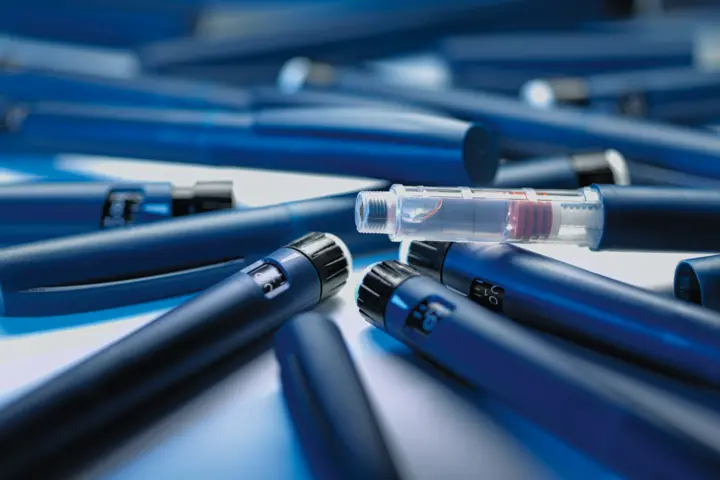Protecting patients and businesses
For example, quality monitoring systems based on small force sensors can be used to verify the correct assembly of spray inhalers – such as those regularly used by asthma patients to take their medication. To prevent contamination, the mouthpiece is closed with a protective cap that only sits correctly if it is placed in position with a specified force during production. The process is monitored using slide-mounted Kistler sensors that measure in the pulling direction; then it is recorded via the maXYmos TL evaluation unit. Performing quality assurance directly in the production line ensures that the inhalers will function correctly. This largely eliminates the need for costly end-of-line scrap checks. The benefits: significantly enhanced process reliability and product quality for the end customers.
The dosage is all-important
Quality inspection is even more important in devices where the active substance is delivered directly to the patient, such as the disc inhaler. In this device, the supply of medication is triggered by a rotary switch based on a spring mechanism. Here too, Kistler torque sensors and the matching maXYmos monitoring system allow precise checks on correct preloading of the spring, to make sure that the appropriate quantity of medication is released when the device is triggered.
If the dose is too small or too large, the patients’ health could be impaired – and the manufacturing companies could face a huge risk. The U.S. Food and Drug Administration (FDA), which is the regulatory authority in this sector, sets very strict requirements for medical devices – and in a worst-case scenario, high recourse claims could ensue. Process-integrated verification of the correct dosage – made possible thanks to Kistler – helps to avoid a hazard to patients’ health, and also to safeguard companies against unwelcome claims for compensation.
Maximum quality from forming through to final acceptance
The insulin pen is a complex medical device that diabetes patients use regularly to inject the insulin that keeps them alive. Not only does this device involve the manufacture of several plastic parts with very low tolerances; it is also necessary to join these parts to the expensive capsule of active substance and the triggering mechanism, so as to create a functioning product. For these reasons, all function-related plastic components of the pen must be tested at the earliest possible stage of the process.
Thanks to cavity pressure monitoring, a decision on whether a produced part is good or bad can already be taken during the injection molding process. What makes this possible? The ComoNeo monitoring and control system, based on piezoelectric cavity pressure sensor technology. Again, our tried-and-tested force and torque sensors come into play during the assembly of the pen to ensure that the upper and lower caps are correctly positioned and engaged. The spring force of the triggering mechanism can also be tested to prevent medication errors. The technology deployed here guarantees uninterrupted quality inspection for large quantities – over 100 million units per year and manufacturer; it reduces scrap, cuts costs substantially and supplies end-to-end documentation of the production processes.
Calibration on the plant – part of Kistler’s service
Kistler offers its customers a special service so they can efficiently meet the strict requirements for the manufacture of medical devices. The small force and torque sensors used for these applications can be calibrated directly on the plant, with no need to dismantle them. This minimizes costly machine downtime and also eliminates complex acceptance procedures for the entire plant after the sensors have been calibrated. Another plus: the measured values and process data obtained are processed as appropriate and made available to the customer. The same measurement technology can also be used to perform sample testing, e.g. for quality assurance purposes. In combination with a direct manipulation-proof connection to the customer’s quality database, this ensures that all quality-related data is stored securely.
Kistler already delivers solutions for the medical technology market: for our customers both in the U.S. and across the globe, we offer tried-and-tested systems for efficient quality assurance and process optimization.
From forming through to production, assembly and product testing, our systems create the conditions for better quality of life and patient wellbeing – enabling production companies to meet the challenges of the future.




